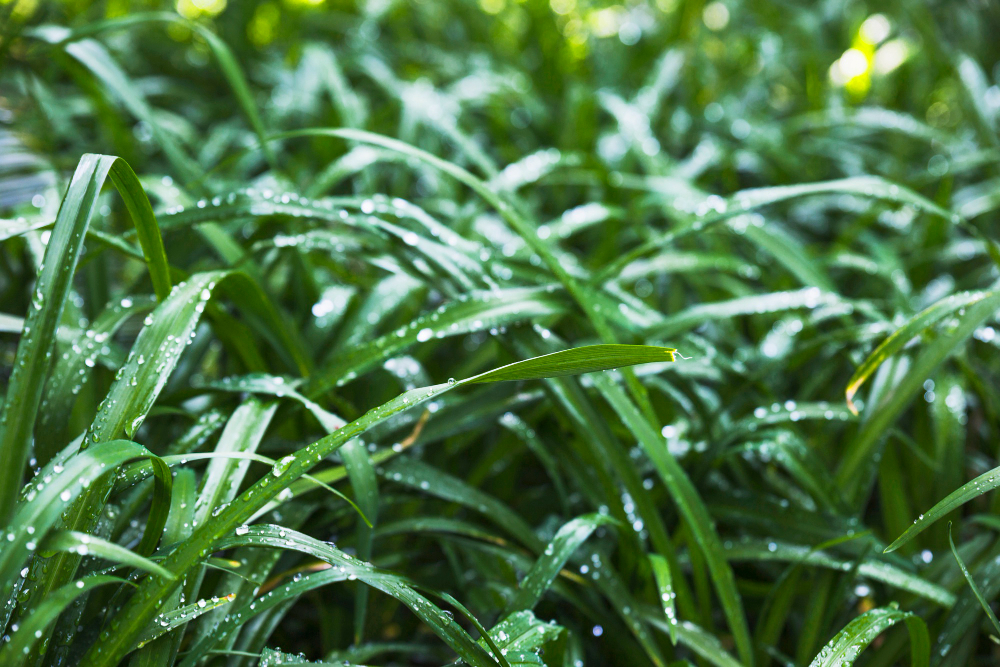The Signs of Overwatering

A vibrant and lush lawn is the crown jewel of home landscaping, marking the fruition of meticulous care and nurturing. Yet, in the quest for the perfect green carpet, there's a common pitfall: the overzealous application of H2O. Overwatering can be just as damaging as its arid counterpart, drought. For every green thumb in Orlando, recognizing the signs of overwatering is critical to maintaining healthy sod. If you're in search of reputable sod contractors in Orlando, FL, 'From The Ground Up Landscaping' is your go-to for expertise and free estimates.
Wilting: A Sign of Too Much Love?
Ironically, an overwatered lawn can mimic the symptoms of drought. If you notice that the blades are wilting, it's time to reassess your watering patterns. While every blade of grass naturally seeks the sun, a wilted blade lies listlessly, indicating that it may have received one too many showers.
Yellow Tells a Cautionary Tale
Yellowing grass is a signal that should prompt immediate attention. This discoloration stems from a lack of oxygen to the roots, as excessive water clogs the soil's air pockets. The result is a suffocated root system and a yellow lawn crying out for moderation.
Mushy Ground: A Sodden Concern
After watering, the ground should absorb moisture, providing a firm foundation underfoot. However, overwatering leads to a persistently mushy, sponge-like feel. This swampy condition is not conducive to the robust health of sod.
Algae and Fungi: Unwanted Guests
A lawn that's too damp creates a welcome mat for algae, fungi, and mold. If you spot a slimy or fuzzy growth between grass blades or soil, it's possibly due to excessive moisture. Any signs of these pesky intruders warrant a revision of your irrigation schedule.
Thatch Development: The Layer to Watch
Thatch is a layer of organic matter that accumulates between the soil and the living grass. When you overwater your lawn, thatch tends to build up faster as it hinders the decomposition process. A thick layer of thatch can lead to root rot and numerous lawn diseases.
Insects: Watering Indirect Invitations
Insects often flock to moist conditions, especially if overwatering causes stress to your lawn, making it more susceptible to insect infestations. Watch out for unusual insect activity, another indicator that your irrigation might be excessive.
Root Rot: Silent but Deadly
Root rot may go unnoticed until extensive damage occurs since it happens beneath the surface. This silent assailant gnaws away at the life force of your sod, leading to inevitable decay if not addressed.
Prevention and Management: A Delicate Balance
Preventing overwatering begins with understanding the unique needs of your lawn. Utilize the expertise of local professionals to tailor a watering regimen that suits the specific requirements of your grass type and soil conditions. In Orlando, local climate factors heavily into watering schedules, and 'From The Ground Up Landscaping' can provide the necessary guidance.
Ensure that your irrigation system is in tip-top shape and that water dispersion is equal throughout the lawn. Employing rain sensors can help adjust automated sprinkling systems during bouts of natural rainfall.
If signs of overwatering surface, cut back on watering immediately and allow the sod to dry out. Aerating compacted soil can alleviate waterlogged conditions, promoting aeration and a return to equilibrium.
In Need of a Lifeline?
Enlisting the help of certified sod contractors in Orlando, FL, could be the difference between a thriving lawn and one that's simply treading water. From The Ground Up Landscaping is skilled in sod installation, maintenance, and recovery strategies. Do not hesitate to contact them if your lawn exhibits any concerning symptoms.
Grow your knowledge and sustain your lawn's health by being vigilant in your lawn care practices. Now, armed with this vital information and From The Ground Up Landscaping's free estimates, your turf is set to flourish without drowning in excess love. Remember, even the most established grass requires a keen eye towards balance - the balance of nature's elements, that is.
For landscaping that breathes life into your property, reach out to the best sod contractors in Orlando, FL. Contact From The Ground Up Landscaping today for more information and ensure that overwatering never takes the sheen off your green!